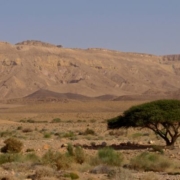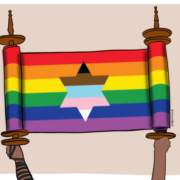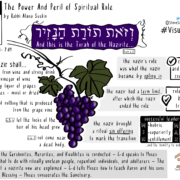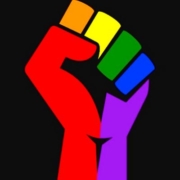Sh’lach: Communal Reliance (Numbers 13:1-15:41)
Part of an ongoing series that explores Torah through an ethic of social justice and building a world worthy of the Divine
וַיַּ֧הַס כָּלֵ֛ב אֶת־הָעָ֖ם אֶל־מֹשֶׁ֑ה וַיֹּ֗אמֶר עָלֹ֤ה נַעֲלֶה֙ וְיָרַ֣שְׁנוּ אֹתָ֔הּ כִּֽי־יָכ֥וֹל נוּכַ֖ל לָֽהּ׃
Caleb hushed the people before Moses and said, “Let us by all means go up, and we shall gain possession of it, for we shall surely overcome it.”
Numbers 13:30
In this parsha, Moshe sends 12 spies to explore the Land of Israel. Ten are overwhelmed, and convince the people that it will be too difficult to possess the Land. Only two, Caleb and Joshua, son of Nun, see otherwise.
When the spies return from scouting out the land of Israel they are filled with worry and distractions. Caleb however responds by focusing through faith. The physical world is a reflection of the spiritual and if the land of Israel is presenting as overly protected, then there must be an essential parallel spiritual identity. Caleb argues that approaching the land of Israel through a lens of Divine security is reassuring.
In Hebrew, the word for noise “rash – רַעַשׁ” is related the word for “evil – רָשָׁע” because noise distorts and distracts from the intellects ability to think clearly. Caleb silences the people’s doubts by reminding them of the source of true power in the world; God.
Rabbi Akiva taught that Jerusalem is alluded to in the letter “ס -samech” meaning supported, as King David wrote1 “יְֽרוּשָׁלַ֗͏ִם הָרִים֮ סָבִ֢יב לָ֥֫הּ וַ֭’הֹ סָבִ֣יב לְעַמּ֑וֹ מֵ֝עַתָּ֗ה וְעַד־עוֹלָֽם – Jerusalem, mountains enwrap it, and Hashem enwraps God’s people, from this time and forever. Feeling surrounded by God is the greatest protection from the fear of others causing harm.
The letter “נ” is the 14th letter in the Hebrew alphabet, followed by the letter “ס”. In the alphabetic acrostic of Ashrei, the letter “נ – nun” is omitted because it represents nefelah – falling. The next verse2 begins “סוֹמֵ֣ךְ ה’ לְכָל־הַנֹּפְלִ֑ים – God supports all those who have fallen”. This order is followed in our parsha as well.
When the spies are describing how powerful the inhabitants of the land are, they detail the occupation of the Canninites as “הַיָּ֔ם וְעַ֖ל יַ֥ד הַיַּרְדֵּֽן” – being situated by the sea and along (yad) the Jordan. “יַ֥ד –yad” is how the number 14 is written in Hebrew, and is one of several allusion to the “nun”, the 14th letter, in this phrase.3 The numerical value of the letter “nun” is 50 as is the word “יָּ֔ם – Sea”. “Jordan”, in Hebrew “יַּרְדֵּֽן” can be parsed יַּרְדֵּֽ–ן, a decent to the oppressive qualities of the “nun”.
Caleb answers this claim, in the following verse, with the word “יַּ֧הַס” which literally means “silence” and is understood by the rabbis to also be read “יַּ֧-הַ-ס”, the 15th letter is the “ס”, which stands for the support against falling. יַּ֧-הַ is also one of God’s names and Caleb is reinforcing his argument, against the other spies, by returning our faith to God as the source of our success.
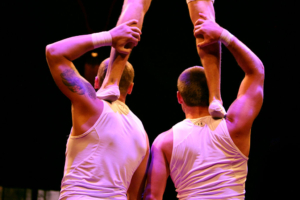 Source: File:Teamwork (5893295462).jpg – Wikimedia Commons
Source: File:Teamwork (5893295462).jpg – Wikimedia Commons
The “ס” is also the letter that most represents unity and equality, in that every place on the circumference is equidistant from the epicenter. Jerusalem, in Hebrew, is composed of the words for reverence and peace – ירא ושלם,4 and we are told that it will only be built when we are in a respectful collective.5 Committing ourselves to support each other generates the necessary merit for God to reciprocate, through Divine protection for our communities.6
The spies fell short of their faith in the power of the people, in partnership with God. It was on the 9th of the Hebrew month of Av that they prioritized their insecurities over the comfort that God’s belief in them should have provided, and chose to deliver an evil report about the land. Both of the Temples were destroyed on that day and it continues to be the saddest day on the Hebrew calendar.
Leil Seder, the night of the Passover Seder, is always the same day of the week as the 9th of Av, and much of the Haggadah is oriented towards correcting the ongoing breakdown in communal relationships that prevent the Temple being rebuilt. That night aspires to reorder the world in such a way that next year we are worthy of being in Jerusalem.
Seder – סדר, literally means “order” and can be framed homiletically as “ס-דר”, living with the [ideals of] “samech”. It is hard, in isolation, to believe that we can successfully stay up when we have been knocked down so many times before. The closer we are to each other, the more support we have to stand tall and support each other in reinforcing our commitment to Caleb’s charge of “we shall overcome”.
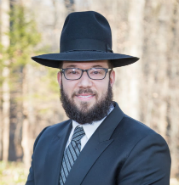
Rabbi Mike Moskowitz, a founding builder at Bayit and also a member of Bayit’s Board, serves as Scholar-in-Residence for Queer and Trans Jewish Studies at Congregation Beit Simchat Torah, a flagship LGBTQIA+ synagogue in New York City.
Endnotes
- Psalms 125:2.
- Psalms 145:14.
- See the Chamra Tavah for a more complete explanation.
- Torah Temimah on Lamentations 2:13:3.
- See Jerusalem Talmud Chagigah 3:6.
- See Tiv HaTehilim.



